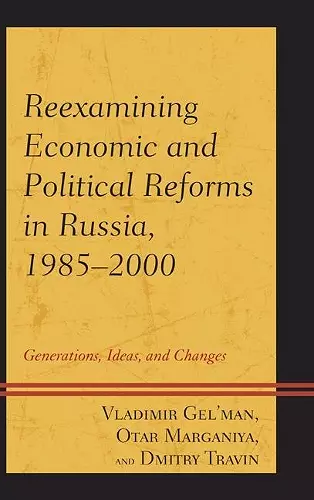Reexamining Economic and Political Reforms in Russia, 1985–2000
Generations, Ideas, and Changes
Vladimir Gel'man author Otar Marganiya author Dmitry Travin author
Format:Paperback
Publisher:Lexington Books
Published:28th Mar '17
Currently unavailable, and unfortunately no date known when it will be back

Reexamining Economic and Political Reforms in Russia, 1985–2000: Generations, Ideas, and Changes analyzes the impact of generational changes and ideational changes on major political and economic reforms conducted in Russia during the late twentieth century. This book examines how the policy agenda was shaped by the ideas of the generations’ representatives for the “sixtiers” and “seventiers.” Representatives of the generation of “sixtiers” conducted reforms from 1985 to 1991 and invested major efforts in political liberalization but did not pay enough attention to economic reforms. On the other hand, the reformers from the generation of “seventiers,” who were in charge of policy making from 1991 to 1998, were genuinely oriented toward market building but rather insensitive to the democratization of the political regime. This book explores how these differences in ideational agendas produced inconsistent and controversial outcomes from both stages of reforms. As a consequence, Russia only partially implemented the idea of market economic reforms, while the process of political reforms resulted in the rise of new authoritarianism.
[This book] provides an excellent overview of the political and economic reforms during a crucial fifteen-year period in Russian history . . . Readers will . . . recognize the book's great value in contextualizing the beliefs of the late Soviet and post-Soviet reformers within a broader historical evolution of ideas and experiences. Both experts and students of Russian political economy will learn from this clearly written, empirically rich book. * The Russian Review *
In this lucid, stimulating and highly readable work...the authors examine what they call the 'long and winding road' of economic and political transformation in the USSR/Russia since 1985. * Europe-Asia Studies *
Reexamining Economic and Political Reforms in Russia presents a broad-brush, historical account of changes in Russian elite thinking…. [This] book end[s] with the assertion that Russia is on ‘the path to freedom,’ yet one can’t help but wonder, given that the analyses presented seem to suggest further stagnation in Russia’s medium-term future, whether this assertion is a prognosis or merely a hope. * Slavic Review *
This short book offers a novel interpretation of the changes that have wracked Russia over the last 30 years. The book argues that change in Russia has been driven by ideas and generational change…. [T]his useful volume is the best brief history of the recent Russian past and the ideas that have driven change that we have and is recommended for specialists and students alike. * Political Studies Review *
Reexamining Economic and Political Reforms in Russia, 1985-2This is a splendid read, a great intellectual analysis of Russia’s post-communist transformation by some of St. Petersburg’s foremost scholars. This book focuses on ideology, generations, and sociology rather than politics and economics. In an accessible language with all relevant Russian and Western academic references, the authors bring out the complexity of the Russian transition. Their writing is original and open-minded, more like brain-storming than a set theory, helping us to understand the confusing Russian transformation.000 takes a pioneering step away from long-running debates over whether the 1980s and 1990s reforms were good or bad for Russia, and blazes new trail on the very important question of how we can explain these reforms as major historical phenomena. The authors’ account is fascinating and novel, tracing different phases of reforms to ideas specific to particular generations dubbed the ‘sixtiers’ and ‘seventiers.’ This approach provides a useful framework for thinking about how Russia will change once a new generation reaches the pinnacle of power, one whose formative experiences postdate the Soviet period. -- Henry E. Hale, George Washington University
This is a splendid read, a great intellectual analysis of Russia’s post-communist transformation by some of St. Petersburg’s foremost scholars. This book focuses on ideology, generations, and sociology rather than politics and economics. In an accessible language with all relevant Russian and Western academic references, the authors bring out the complexity of the Russian transition. Their writing is original and open-minded, more like brain-storming than a set theory, helping us to understand the confusing Russian transformation. -- Anders Aslund, Peter G. Peterson Institute
ISBN: 9780739197141
Dimensions: 230mm x 151mm x 15mm
Weight: 295g
192 pages